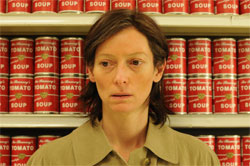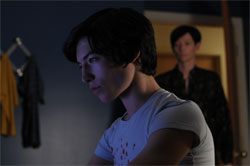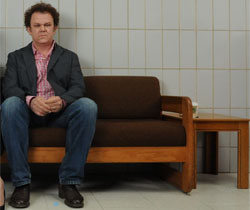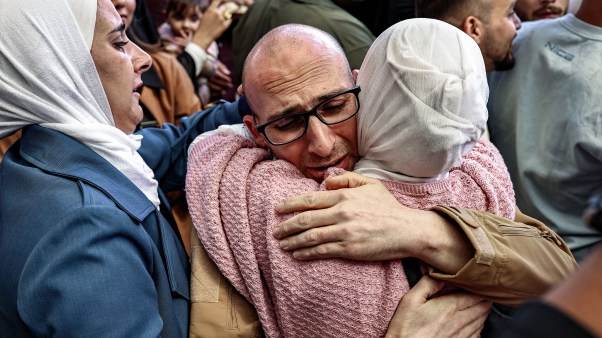When Kathy Harris and Sue Klebold woke up on April 20, 1999, they could not have anticipated that before the day was through, their sons—Eric and Dylan—would be known throughout the world as the perpetrators of one of the bloodiest school massacres in American history. Nor could they have known that from that day forward, the world would look scornfully at them—the parents—as the culpable failures who raised such monsters. We Need to Talk About Kevin is about the sad and terrifying emotional terrain occupied by mothers like Kathy and Sue—mothers whose sons turned out horribly wrong. It’s a harrowing look at the days before and after a Columbine-style massacre, told from the perspective of the teenage killer’s mom.
In this fictional story, based on Lionel Shriver’s 2003 novel of the same name and directed by Lynne Ramsay (Ratcatcher), the mother in question is Eva Khatchadourian (Tilda Swinton), and the son in question is Kevin—played at various ages by multiple actors, but most chillingly by Ezra Miller as teenage Kevin. The film cuts back and forth in time between memory flashes of the actual massacre Kevin commits in his high school, the aftermath years in which Eva tries to put the horrors of her past behind her, and a hodgepodge of memory vignettes from the raising of Kevin, who from birth was a “problem child.”

Much of the film takes place in the past as Eva and her husband Franklin (John C. Reilly, in an rather bland, but appropriate role) raise their two kids in an unnamed-but-wealthy suburban setting. The firstborn is Kevin, a dark, angry boy who looks goth and has a passion for archery (red flag?). His little sister Celia (Ashley Gerasimovich) is quite his opposite: jovial, social, innocent. Though we known where the film is going from the get-go (Kevin perpetrating some sort of school massacre), the drama comes through our trying to understand why. What happens in Kevin’s childhood that leads him to become a murderer? Are the parents at fault?
It’s hard to find the right word to capture the tension of watching Kevin: unsettling, disturbing, horrifying, intense. All seem inadequate. It’s a white-knuckle film, but not in the manner of a typical Hollywood thriller. There are no chase scenes or close-call escapes. There are only a few scenes of violence, and very little blood. It’s not at all gruesome or explicit. But it’s a far scarier movie to sit through than most zombie, exorcism, or slasher films you might see.

One reason is that as a character, Kevin is exceedingly creepy. In the film—that is to say, in Eva’s memories—he is portrayed as a nearly demonic miscreant who from infancy exhibits malevolent and anti-social tendencies. He screams endlessly as a baby. As a toddler he refuses to be potty-trained, apparently to spite his mother. He curses and talks back to Eva as a first-grader. He destroys Eva’s art room (her solace within the house). He terrorizes his innocent sister. Why? Is he evil at birth or did nurture somehow render him thus? Either possibility is chilling.
The other main force of the film’s power is Swinton, an actress who throws herself into roles and certainly does so here. Eva is a deeply layered character, a conflicted woman who wants to be a good mother but also knows she isn’t the best at it. A former best-selling travel writer who spent enticing summers in places like Italy and Spain (the opening shot of the film shows her writhing around joyously, and ominously, in blood-like tomatoes during La Tomatino festival), Eva never quite seems happy in domestic life. Motherhood for her is constraining, victimizing, deadening. Or at least that’s how it looks from her perspective, in solemn retrospect.
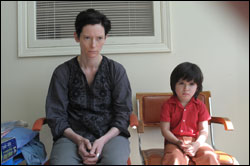
Part of the curiosity of this film is its point of view. Everything in Kevin is a memory of Eva’s—tainted by her own psychological and emotional issues (maternal guilt, grief, fear, loneliness). It’s hard to know how much of her memories are objective and accurate. Did it really happen that way? Was Franklin really such a clueless, enabling father? Was Kevin quite so cold and reptilian, even from diapers?
That said, I’m not so sure Ramsay intended this film to primarily be a meditation on unreliable narration or post-traumatic psychological lament. Nor do I think Kevin is first and foremost about school shootings or violent teenagers. Rather, Ramsay’s film seems primarily concerned with motherhood. What happens when—as appears to be the case with Eva and Kevin—you give birth to a baby who seems to loathe you? Or worse: what happens when you fail to connect with your baby at birth and come to resent them for it? Ramsay and Swinton offer no easy answers but raise difficult, elemental questions that are rarely discussed. What happens when that ever important mother-child bond just isn’t there?
Perhaps one of the most unnerving things about Kevin is that, while Eva clearly feels distant from her son and—especially after the massacre—wants to forget that he is her flesh-and-blood, the truth is that Kevin is his mother’s son. Eva isn’t a murderer, but she shares aspects of Kevin’s personality. She has her own dark, misanthropic moments. And physically, the apple did not fall far from the tree. Kevin has the pale, wiry, androgynous look of his mother—even the same swoopy dark hair. As hard as it is for Eva to understand how her own son could be such a monster, it isn’t hard at all to understand that he is her son.
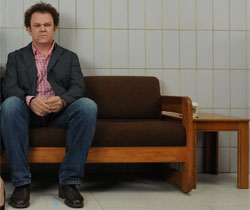
Parenting can be treacherous terrain, as any parent or child (i.e., everybody) knows. The stakes couldn’t be higher. We Need to Talk About Kevin taps into the tension of that terrain and delivers a frightening film that plays less like a Focus on the Family parenting manual than it does a troubled diary of a jittery parent. In the end, the question of Eva’s relative goodness or badness as a mother is beside the point. There may or may not be “mistakes” that we can learn from in her child-rearing techniques. But we can lament alongside her, pondering and pitying the world she lives in—a world where every evildoer is somebody’s son or daughter.
Talk About It
Discussion starters- What makes Kevin do what he does? Is the problem nature or nurture?
- Does God create children like this? Is God at all to blame when children turn out this way? Why or why not?
- What did Eva do right in parenting Kevin? What did she do wrong? Is she to blame?
- If you were a parent and had a child like Kevin, what would you do to get through to him?
The Family Corner
For parents to considerWe Need to Talk About Kevin is rated R for disturbing violence and behavior, some sexuality and language. It’s a disturbing film, with a prevalent ambience of evil; it’s not for young viewers. The violence is mostly implied and there is no more blood than your average PG-13 action film. A few main characters are seen bloodied and dead. The film contains some language as well (from the mouth of a young child), and a brief scene of sexuality.
Photos © Oscilloscope Media
Copyright © 2012 Christianity Today. Click for reprint information.

